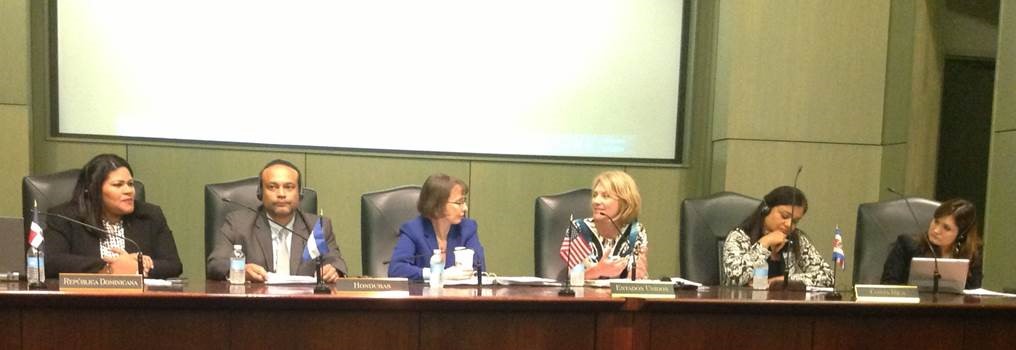The United States hosted the eighth meeting of the Dominican Republic-Central America-United States Free Trade Agreement (CAFTA-DR) Environmental Affairs Council (Council) on April 2, 2014 in New Orleans, Louisiana. AUSTR for Environment and Natural Resources Jennifer Prescott co-chaired the meeting with Principal Deputy Assistant Secretary of State for the Bureau of Oceans and International Environmental and Scientific Affairs Judith Garber.

CAFTA-DR Environmental Affairs Council Members at the Public Session at the Port of New Orleans: L-R: Rosa Otero, representative from the Ministry of Environment (Dominican Republic); Minister José Antonio Galdames, Secretariat of Energy, Natural Resources, Environment and Mining, Ministry of Natural Resources and Environment (Honduras); Principal Deputy Assistant Secretary Judith Garber, Bureau of Ocean and International Environmental and Scientific Affairs, U.S. Department of State; Jennifer Prescott, Assistant United States Trade Representative for Environment and Natural Resources, Office of the United States Trade Representative; Vice Minister Ana Lorena Guevara, Ministry of Environment and Energy (Costa Rica); Jenifer Calderon, representative from the Ministry of Environment and Natural Resources (Guatemala).
Each Council Member presented on progress made in their country to implement core commitments of the CAFTA-DR Environment Chapter, including efforts to improve levels of environmental protection, strengthen environmental laws and environmental law enforcement, and promote public participation in environmental decision-making. The Council acknowledged the valuable contributions the Secretariat for Environmental Matters has made to public participation and outreach. Since 2007, the Secretariat has received 29 submissions from the public regarding effective enforcement of environmental laws that have fostered a constructive dialogue among stakeholders and the CAFTA-DR Parties and have led to a number of positive improvements in environmental enforcement.
The Council also discussed important achievements through environmental cooperation programs, including the provision of training for customs and border officials on wood identification to combat trade in illegally harvested timber, collaboration with hundreds of small and medium enterprises to help reduce their use of water, energy and raw materials, and support for the Central American Wildlife Enforcement Network (CAWEN) to enhance regional enforcement of wildlife trafficking laws.
The Council Members underscored that progress under the CAFTA-DR Environment Chapter and Environmental Cooperation Agreement is a success story, demonstrating that trade agreements can not only facilitate economic growth and opportunities, but can do so in a "race to the top" that advances environmental stewardship, encourages public-private partnerships, and promotes transparency and public participation.
The Council Members reaffirmed their strong commitment to continue to work together on a number of pressing environmental issues ranging from building additional capacity to conduct environmental impact assessments to engaging in a concerted effort to further broaden the scope of outreach to public stakeholders, including those in remote communities.
The Council also hosted a half-day public session at the Port of New Orleans to demonstrate the tangible intersection of trade and environment issues. The public session included three panels discussing a range of issues addressed during the Council meetings. Representatives from academia, the private sector and non-governmental organizations had the opportunity to engage in a robust question and answer session with all of the Council Members and panelists.
The Joint Communiqué can be found here, in both English and Spanish.







